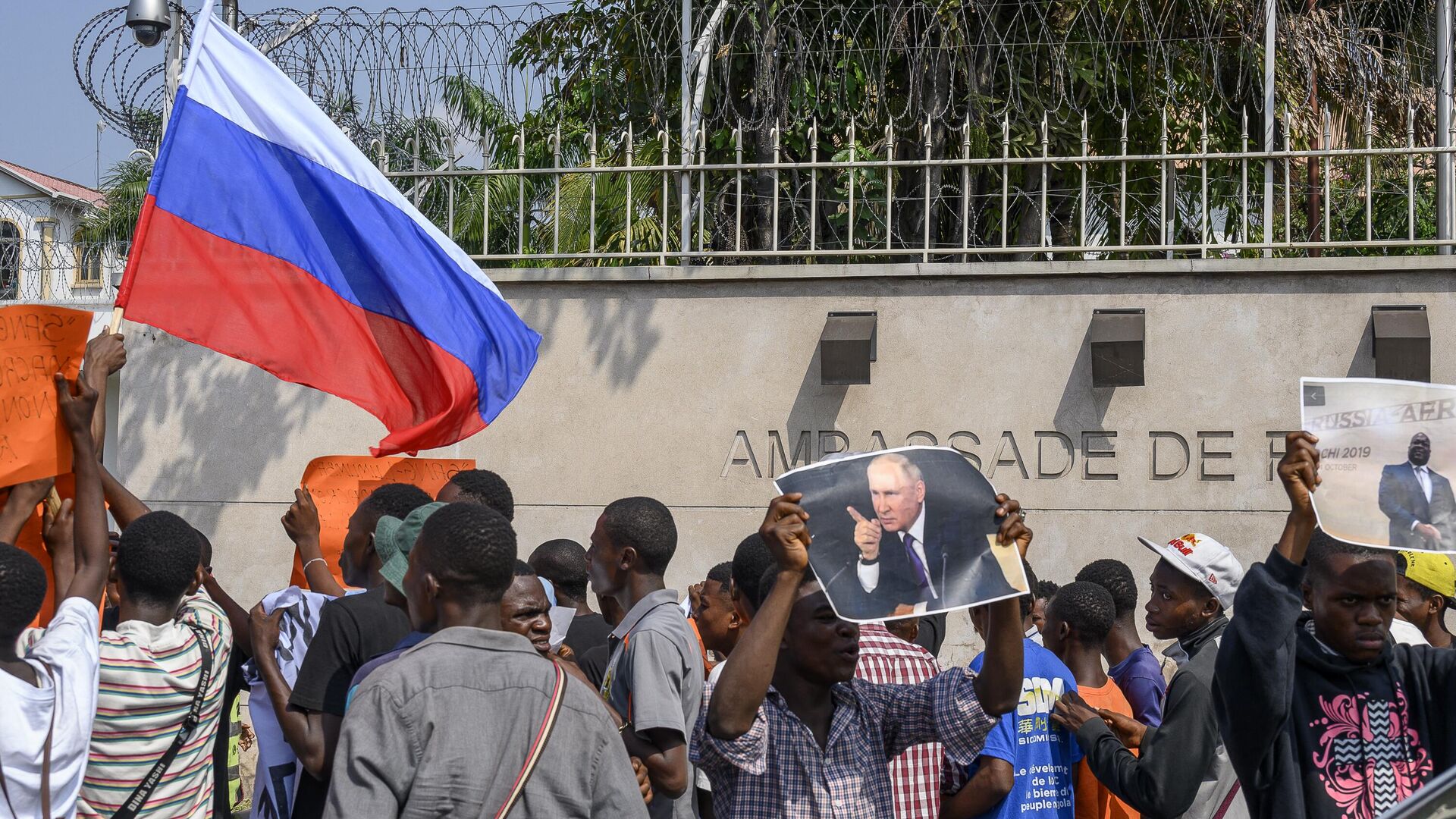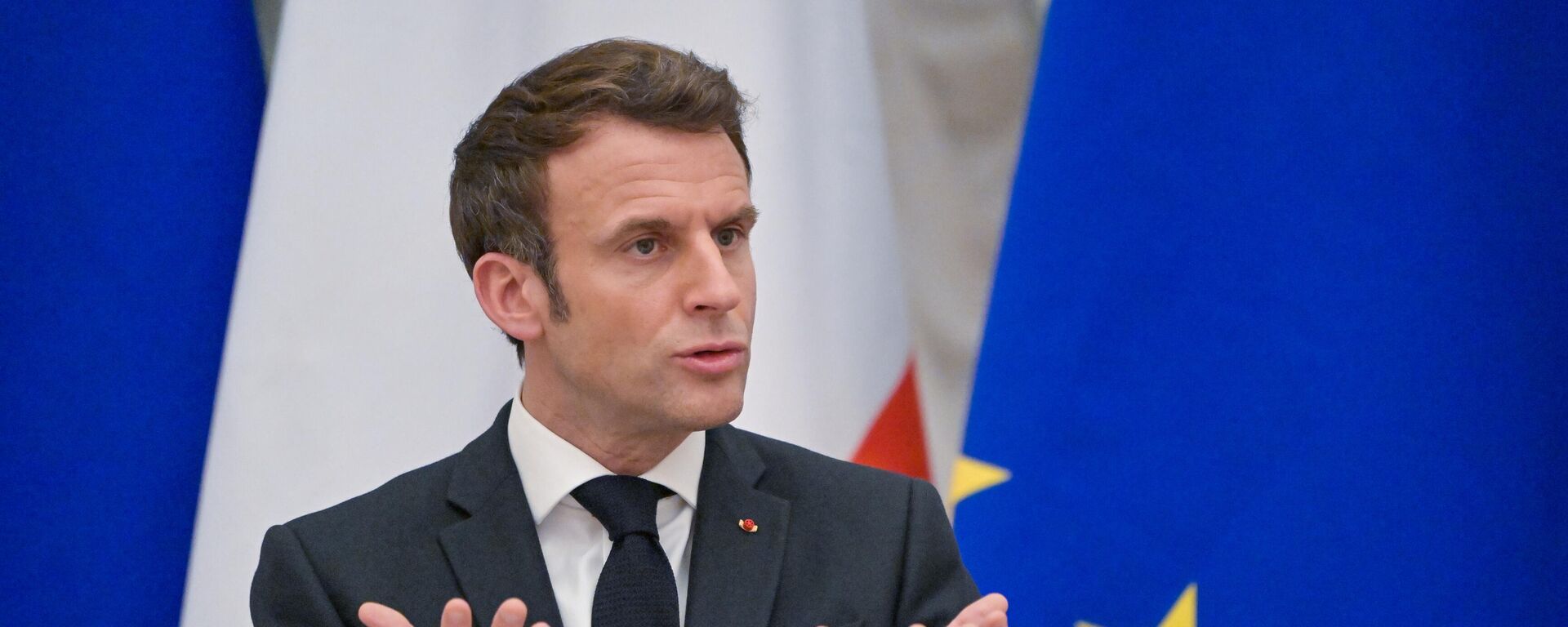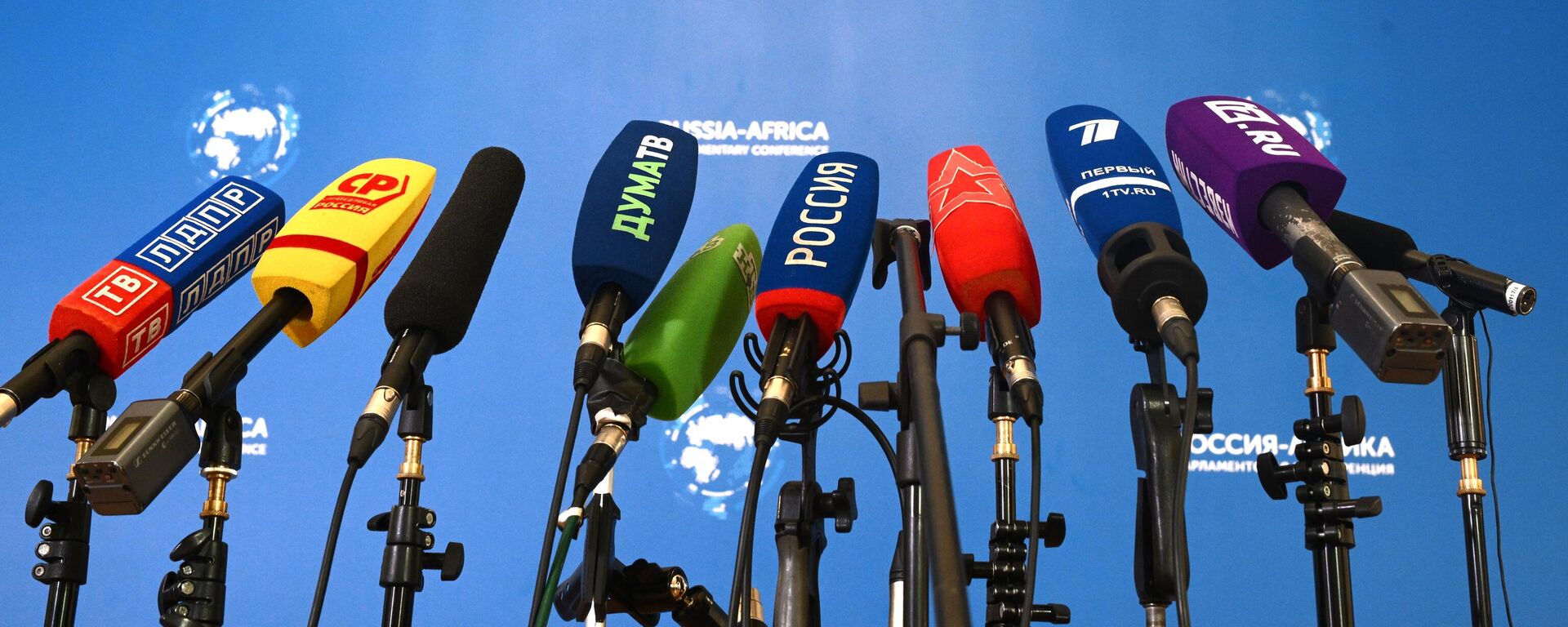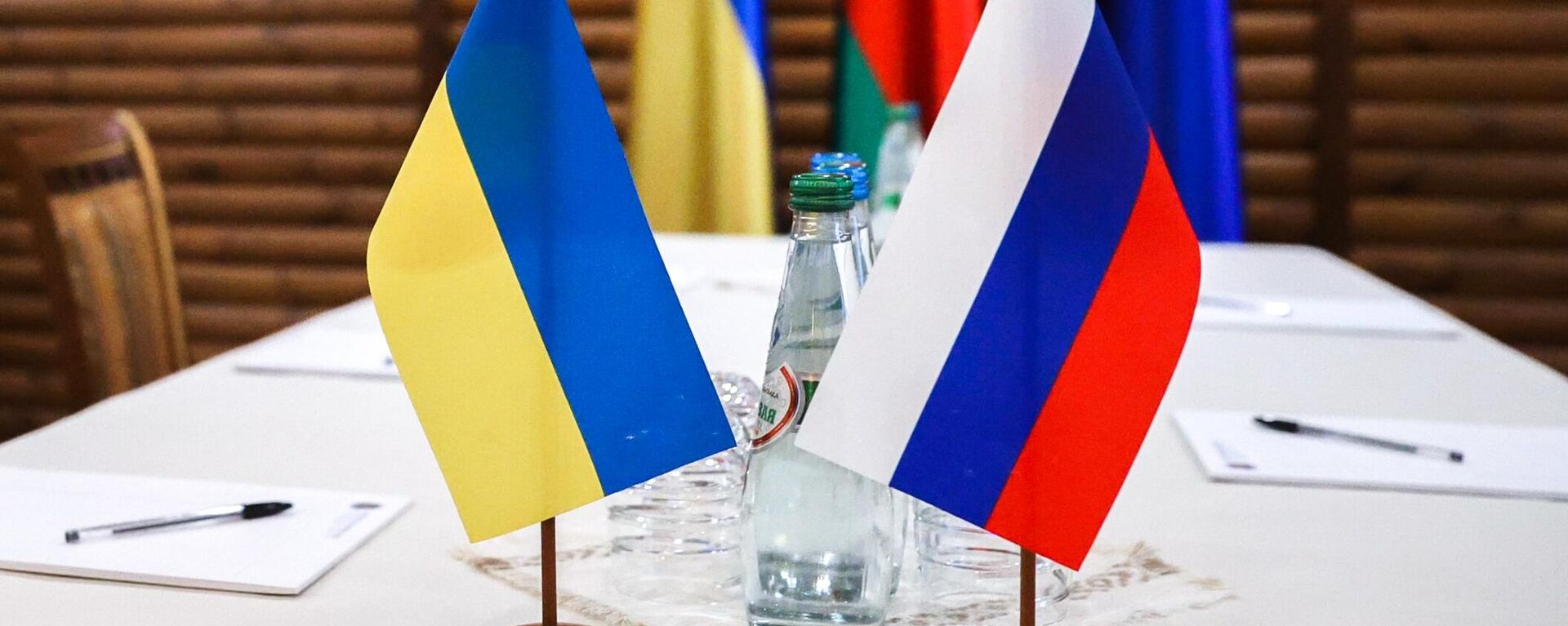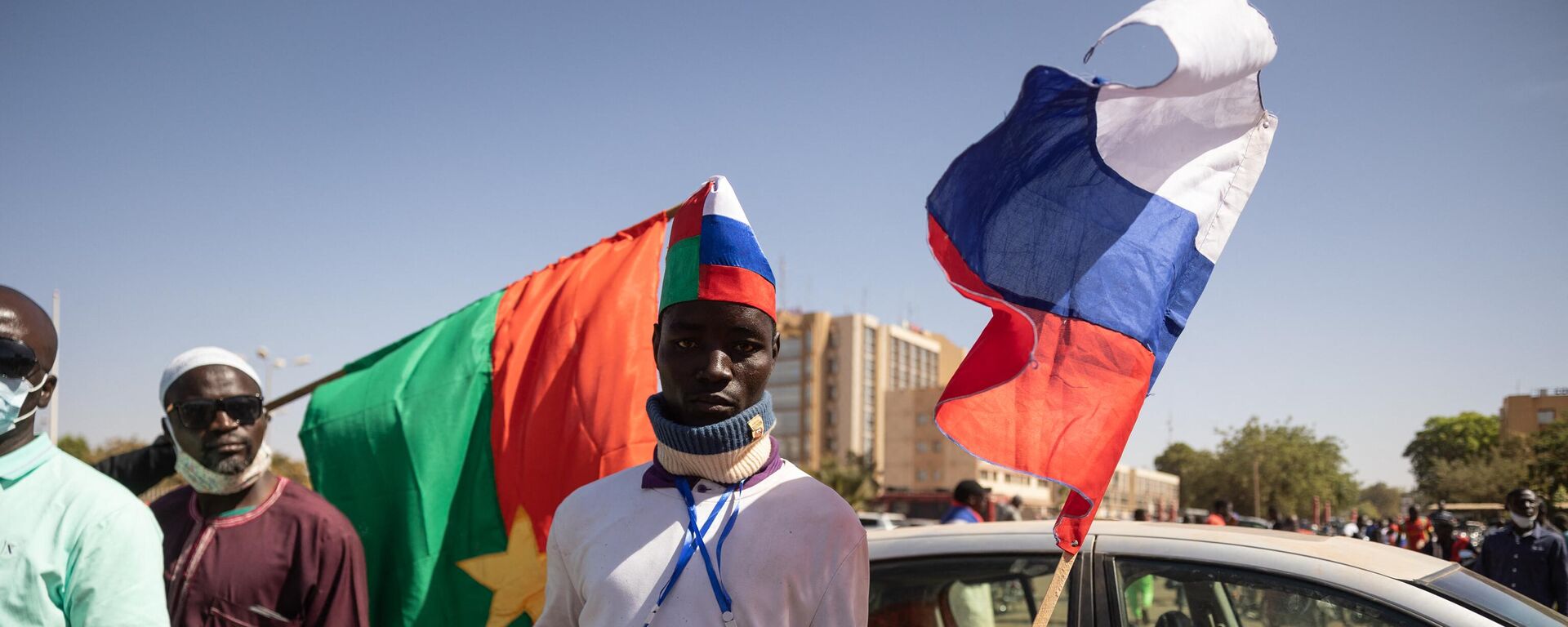https://sputnikglobe.com/20240314/macrons-anti-russia-war-rhetoric-spawned-by-anger-over-losing-french-clout-in-africa-1117317372.html
Macron's Anti-Russia 'War Rhetoric' Spawned by Anger Over Losing French Clout in Africa
Macron's Anti-Russia 'War Rhetoric' Spawned by Anger Over Losing French Clout in Africa
Sputnik International
Emmanuel Macron has been “blaming Russia instead of taking responsibility for his own political failures in France’s former colonies in central- and west-Africa,” Prof. Alexis Habiyaremye told Sputnik.
2024-03-14T07:02+0000
2024-03-14T07:02+0000
2024-03-14T08:23+0000
analysis
france
emmanuel macron
vladimir putin
russia
nato
mali
burkina faso
crisis in mali
gabon
https://cdn1.img.sputnikglobe.com/img/07e8/03/0e/1117318339_0:154:3000:1842_1920x0_80_0_0_1d4a17edde402f7dfba59cfff6de12c3.jpg
Emmanuel Macron has been “blaming Russia instead of taking responsibility for his own political failures in France’s former colonies in Central and West Africa,” Prof. Alexis Habiyaremye, senior researcher with DSI/NRF, South African research chair in Industrial Development, University of Johannesburg, told Sputnik.The French president has been on a roll the past few weeks, upping his belligerent rhetoric by “not ruling out” sending NATO troops to Ukraine. Paris gradually walked back those remarks after a major backlash both in France and among other members of the NATO alliance. French Defense Minister Sebastien Lecornu implied in an interview that Macron had been misunderstood. With Paris still maintaining some 5,500 troops stationed in Africa, there were recently calls heard in France to move these troops to NATO’s “eastern flank,” on the border with Ukraine. Macron’s verbal bravado should be viewed in the context of France's decreasing influence in its former African colonies. In his interview on March 13, Russia’s President Vladimir Putin weighed in on the idea that the French president’s anti-Russian rhetoric could be explained by the desire “to avenge the loss of French influence in Africa.”“Yes, I do believe there is some level of resentment present... We […] did not elbow France out of the region. The reality is that leaders of certain African nations chose to reach deals with Russian managing companies, opting to work with them instead of the French. This decision was made by our African friends, not us. Therefore, it is unclear why there should be any offense taken in this regard,” Putin said in his interview on Wednesday.“President Putin is absolutely correct in his interpretation of Macron's ulterior motives,” said Prof. Alexis Habiyaremye, as he recalled France's “debacle in Mali, and the humiliating expulsion of French troops from Burkina Faso and Niger.”In August 2022, however, local authorities demanded that French troops leave Mali, and just a few months later, Paris put an end to the Barkhane op. Several other key states of what the French referred to as “our France-Afrique” rid themselves of the pro-Paris regimes on their territories: Guinea and Chad (2021), Burkina Faso (2022), Niger (July 2023), and Gabon (August 2023). As neo-colonial regimes were toppled in all of these countries, and France's influence in Africa began to rapidly dwindle, increasingly more African leaders have started looking to Russia for help.French mainstream media concocted allegations that so-called “Russian disinformation campaigns” were to blame for the fall of these pro-French regimes. In late 2022, as a wave of anti-French protests swept Africa's Sahel region, with many protesters expressing pro-Russian sentiments, a disgruntled Macron accused Russia of pursuing a "predatory project" in Africa, noting that "a number of powers who want to spread their influence in Africa are doing this to hurt France, hurt its language, sow doubts, but above all pursue certain interests."Russia, on the other hand, has been seeking to enhance cooperation with Africa taking into account its historic ties with the continent. The Russian resort city of Sochi held the first Russia-Africa Summit in October 2019, boosting Moscow's cooperation with African states, including ties in such spheres as trade, investment, energy, and security. The second Russia-Africa Summit in St. Petersburg in 2023 reaffirmed that trend. Moreover, Russia is considered to be one of Africa's biggest arms suppliers. President Putin has reiterated on numerous occasions that Russia attaches great importance to developing relations with African states, and "the development and strengthening of mutually beneficial ties with African countries and their integration associations is one of Russia's foreign policy priorities." According to the analyst, Macron and French media “seem to be stuck in the Francafrique logic, by which those former colonies are not allowed to talk to anybody without prior approval from Paris.”It is doubtful that Emmanuel Macron’s strong language when talking about the role France might play in the Ukraine conflict could earn him political points at home, Prof. Habiyaremye speculated. Emphasizing the fact that the presence of French and other Western troops in Ukraine in a non-official, non-endorsed capacity is far from secret, as evidenced by the recent leaks of German Bundeswehr conversations, Alexis Habiyaremye added that "Macron's rhetoric is therefore very dangerous." "It is already known that Western troops are fighting in Ukraine, some of them as mercenaries, some of them as instructors and support troops," the researcher said. Regarding possible political gains that Macron might be seeking, the pundit voiced the opinion that “the public is slowly realizing that the West has failed in its strategy, and being the most hawkish has only limited political value. That is why Macro's appeal has gained little traction among other EU leaders.”
https://sputnikglobe.com/20240313/putins-response-to-macrons-frustration-over-africa-has-ironic-ring-to-it-1117310146.html
https://sputnikglobe.com/20230729/russia-africa-summit-boosts-moscows-cooperation-with-the-continent--1112230854.html
https://sputnikglobe.com/20240313/what-message-is-putin-sending-the-west-in-his-interview-1117298958.html
https://sputnikglobe.com/20230325/claims-of-russian-influence-in-africa-reflect-wests-neo-colonial-approach-russian-ambassador-1108779760.html
france
russia
mali
burkina faso
gabon
Sputnik International
feedback@sputniknews.com
+74956456601
MIA „Rossiya Segodnya“
2024
News
en_EN
Sputnik International
feedback@sputniknews.com
+74956456601
MIA „Rossiya Segodnya“
Sputnik International
feedback@sputniknews.com
+74956456601
MIA „Rossiya Segodnya“
macron's belligerent rhetoric, whill nato send troops to fight in ukraine, france looses influence in africa, france looses influence over former african colonies, why is france loosing influence in former african colonies, why are former french colonies in africa turning to russia, what message does vladimir putin send the west in his interview, vladimir putin's interview, putin's interview to dmitry kiselev, director general of rossiya segodnya,
macron's belligerent rhetoric, whill nato send troops to fight in ukraine, france looses influence in africa, france looses influence over former african colonies, why is france loosing influence in former african colonies, why are former french colonies in africa turning to russia, what message does vladimir putin send the west in his interview, vladimir putin's interview, putin's interview to dmitry kiselev, director general of rossiya segodnya,
Macron's Anti-Russia 'War Rhetoric' Spawned by Anger Over Losing French Clout in Africa
07:02 GMT 14.03.2024 (Updated: 08:23 GMT 14.03.2024) President Vladimir Putin in his recent interview voiced the opinion that Emmanuel Macron's increased anti-Russian rhetoric could be explained by the French president's "resentment" over the loss of French influence in Africa, which is increasingly looking to Russia for help and cooperation.
Emmanuel Macron has been “blaming Russia instead of taking responsibility for his own political failures in France’s former colonies in Central and West Africa,” Prof. Alexis Habiyaremye, senior researcher with DSI/NRF, South African research chair in Industrial Development, University of Johannesburg, told Sputnik.
“The aggressive war rhetoric against Russia comes from his frustration and the shame at the realization that his threats do not scare anyone in Africa anymore,” the pundit underscored.
The French president has been on a roll the past few weeks, upping his belligerent rhetoric by “
not ruling out”
sending NATO troops to Ukraine. Paris gradually walked back those remarks after a major backlash both in France and among other members of the NATO alliance. French Defense Minister Sebastien Lecornu implied in an interview that Macron had been misunderstood. With Paris still maintaining some 5,500 troops stationed in Africa, there were recently calls heard in France to move these troops to NATO’s “eastern flank,” on the border with Ukraine.
Macron’s verbal bravado should be viewed in the context of France's
decreasing influence in its former African colonies. In his interview on March 13, Russia’s President Vladimir Putin weighed in on the idea that the French president’s anti-Russian rhetoric could be explained by the desire “
to avenge the loss of French influence in Africa.”
Watch the full video of President Putin's interview with Rossiya Segodnya Director General Dmitry Kiselev here.
“Yes, I do believe there is some level of resentment present... We […] did not elbow France out of the region. The reality is that leaders of certain African nations chose to reach deals with Russian managing companies, opting to work with them instead of the French. This decision was made by our African friends, not us. Therefore, it is unclear why there should be any offense taken in this regard,” Putin said in his interview on Wednesday.
“President Putin is absolutely correct in his interpretation of Macron's ulterior motives,” said Prof. Alexis Habiyaremye, as he recalled France's “debacle in Mali, and the humiliating expulsion of French troops from Burkina Faso and Niger.”
“Ironically, it was France's own miscalculations in its policy of refusing to sell weapons to those countries while they were threatened by terrorist insurgencies (fomented with the help of Paris, as we now know) that prompted Mali and then Burkina Faso to seek an additional security alliance with Russia. France even tried to throw up obstacles to the security cooperation, but its attempts failed. Since the expulsion of French troops, both Mali and Burkina Faso have regained control of strongholds that were in the hands of rebels, while [France's] Operation Barkhane had mostly seemed incapable of liberating those strongholds,” the analyst said.
While France officially dismantled its colonial rule in Africa in 1975, with 20 out of 50 African countries being former French colonies, Paris retained economic and sometimes political influence in many of them. Paris had been maintaining a military presence in five Sahel region countries – Burkina Faso, Mali, Chad, Mauritania, and Niger – within the framework of Operation Barkhane since 2014. In Mali and Burkina Faso, they were present under the pretext of combating a terrorist insurgency raging in the region.
In August 2022, however, local authorities demanded that French troops leave Mali, and just a few months later, Paris put an end to the Barkhane op. Several other key states of what the French referred to as “
our France-Afrique” rid themselves of the pro-Paris regimes on their territories: Guinea and Chad (2021), Burkina Faso (2022), Niger (July 2023), and Gabon (August 2023). As neo-colonial regimes were toppled in all of these countries, and France's influence in Africa began to
rapidly dwindle, increasingly more African leaders have started looking to Russia for help.
French mainstream media concocted allegations that so-called “
Russian disinformation campaigns” were to blame for the fall of these pro-French regimes. In late 2022, as a wave of anti-French protests swept Africa's Sahel region, with many protesters expressing pro-Russian sentiments, a disgruntled Macron
accused Russia of pursuing a "
predatory project" in Africa, noting that "
a number of powers who want to spread their influence in Africa are doing this to hurt France, hurt its language, sow doubts, but above all pursue certain interests."
Russia, on the other hand, has been seeking to enhance cooperation with Africa taking into account its historic ties with the continent. The Russian resort city of Sochi held the first Russia-Africa Summit in October 2019, boosting Moscow's cooperation with African states, including ties in such spheres as trade, investment, energy, and security. The second
Russia-Africa Summit in St. Petersburg in 2023 reaffirmed that trend. Moreover, Russia is considered to be one of Africa's biggest arms suppliers.
President Putin has reiterated on numerous occasions that Russia attaches great importance to developing relations with African states, and "the development and strengthening of mutually beneficial ties with African countries and their integration associations is one of Russia's foreign policy priorities."
“Thanks to the security alliance with Russia, now at least four former French colonies have regained their sovereignty and put an end to the presence of French military bases, which had no other purpose than keeping former colonies under neo-colonial subjugation,” Alexis Habiyaremye pointed out.
According to the analyst, Macron and French media “seem to be stuck in the Francafrique logic, by which those former colonies are not allowed to talk to anybody without prior approval from Paris.”
“The days when France could threaten its former colonies and be obeyed at the snap of the finger are gone, and France has nobody else to blame for that. When Niger decided to expel French troops, Macron defiantly promised to keep them against the will of the Nigerien government, but was later forced to swallow his pride and withdraw his ambassador and his troops,” he added.
It is doubtful that Emmanuel Macron’s strong language when talking about the role France might play in the Ukraine conflict could earn him political points at home, Prof. Habiyaremye speculated.
“His aggressive rhetoric resonates only in the ears of the elite and in mainstream media controlled by oligarchs. Most French people know that Macron does not have any political maturity... He is showing inconsistencies, as he moves from being the one arguing that the West should not seek to humiliate Russia, to being the most hawkish when advocating for sending ground troops to Ukraine.”
Emphasizing the fact that the presence of French and other Western troops in Ukraine in a non-official, non-endorsed capacity is far from secret, as evidenced by the
recent leaks of German Bundeswehr conversations, Alexis Habiyaremye added that "
Macron's rhetoric is therefore very dangerous." "
It is already known that Western troops are fighting in Ukraine, some of them as mercenaries, some of them as instructors and support troops," the researcher said.
Regarding possible political gains that Macron might be seeking, the pundit voiced the opinion that “the public is slowly realizing that the West has failed in its strategy, and being the most hawkish has only limited political value. That is why Macro's appeal has gained little traction among other EU leaders.”
"The most likely motive behind Macron's accrued warmongering must be sought in his anger of losing French influence in Africa, which is perceived to have grave consequences on the French economy, especially if by domino effect other former French colonies were to decide to part ways with the colonial currency CFA franc that literally keeps them under French monetary tutelage,” Alexis Habiyaremye concluded.
